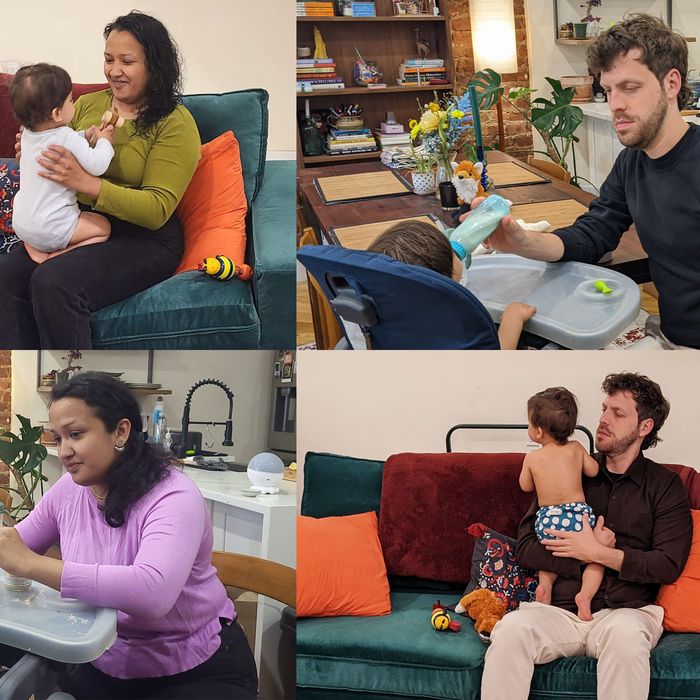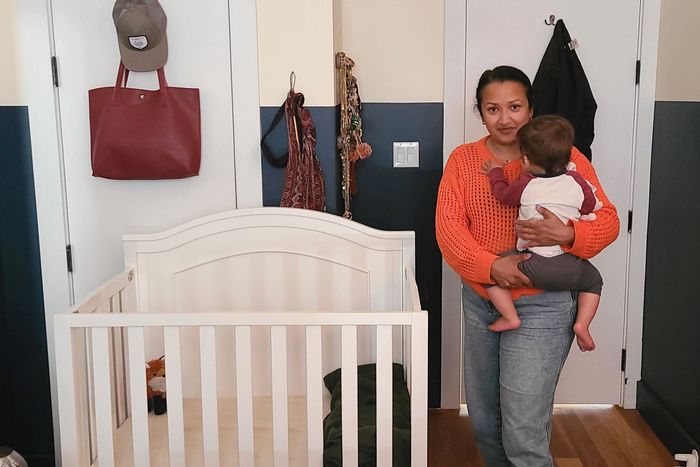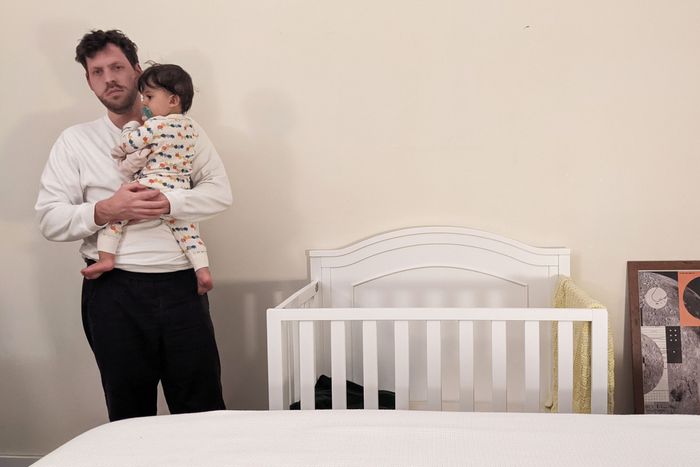
One summer night in 2022, Amrita Vijayaraghavan and Andrew Stephens, both 38 years old, decided to try for a baby. They were at their Flatbush apartment, exhausted from a full day of shooting a film with their eponymous production company, but Vijayaraghavan was ovulating. “I didn’t want to wait another month, so we gave it one shot,” she says. This is the kind of choice couples across Brooklyn make every day, but Vijayaraghavan and Stephens are not that kind of couple. They refer to themselves as “platonic life partners,” and that night they drew a syringe of Stephens’s semen with artificial-insemination supplies they had purchased online and followed the instructions to conceive their baby, who is now 10 months old.
When Vijayaraghavan and Stephens first met as 20-something colleagues (“overworked underlings,” as he puts it) at IMG Artists, they could not have predicted any of this. They weren’t even friends until they were unexpectedly thrown together in Miami on a weekend trip that their other co-workers had backed out of. From there, work happy hours and long nights at the office led to the two producing house concerts and poetry readings in their spare time. This became their full-fledged production and consulting business in 2018, which they mostly worked on from their respective apartments.
As they both approached 30, they began talking about whether either of them wanted children. Stephens, who is gay and was single at the time, was considering it, but Vijayaraghavan was sure she didn’t, certain, as many women are, that parenting would compromise her creative life. But she was open to being a surrogate for Stephens. So the two froze embryos in 2019 (which they have yet to use). Vijayaraghavan’s plan, as she detailed in their podcast series about parenthood, was to be an “interested adult” in the life of Stephens’s child.
That plan changed when the pandemic dried up their production business, and they hit the road, working from Detroit, Cape Cod, and New Orleans. Living together, sharing roommate duties alongside production schedules, Vijayaraghavan realized that co-parenting with Stephens wouldn’t be a miserable slog. She offered to co-parent a child, he accepted, and the couple agreed to move in together.
They wanted to raise their child in New York, but first, they had to find an apartment: one that had at least two bedrooms (one for each of them), office space, and enough common space for their future child. House-hunting from New Orleans was challenging, but in the summer of 2021, a mutual friend connected them with Ariel Lewiton, 39, who was looking for tenants to live in the downstairs unit of her family’s newly purchased Flatbush duplex. What sold them were the amenities — central air, a washer and dryer in the unit, a dishwasher, and a backyard.
Vijayaraghavan and Stephens moved in several months later, and when their son was born, they had a co-parenting agreement in place that split their duties and the expenses of raising a child equally (brokered with help from the Chosen Family Law Center). When their son was around 6 months old, which was when Vijayaraghavan stopped breastfeeding and their son’s routine became more predictable, the couple formally split child care into a morning shift (9 a.m. to noon) and an afternoon shift (1 p.m. to 4 p.m.), with one caring for him (typically upstairs or out of the house) while the other rests in their room or works downstairs. The overnight shift of caring for their son, which they initially shared, is now up to the person on the morning shift. “If the baby cries, there’s never a question of who’s going to respond,” says Vijayaraghavan. They add evening plans — like her orchestra rehearsal or his choir practice — to a shared Google Calendar and end up spending about half of their weeknights together with their son. For everything else, Stephens says, “We’ll look at the calendar and make sure one of us is here at night, or we’ll get a babysitter.” For Vijayaraghavan, her experience of motherhood has exceeded her expectations. “I often joke that I’ve cracked the cheat code on being a mom by doing it this way,” she says. Both agree that their relationship works precisely because they’re not romantic partners. “We’re friends and roommates, so the expectations we have of each other are spoken. There’s not a lot that’s assumed,” says Stephens.
Their two-bedroom, three-bathroom duplex is now comfortably cluttered with hand-me-downs, stoop finds, and other objects of their overlapping lives (they described their shared aesthetic as “maximalist”). Their office and creative studio are downstairs, and upstairs, they each have their own bedroom. Their son doesn’t have his own room, so the couple shuttle his collapsible crib around the apartment. “We recently hung up curtains in an alcove between the coat closet and the basement door and roll his crib in there at night. We haven’t gotten much further than that,” Vijayaraghavan says.
Like their parenting agreement, the two also split their roommate responsibilities 50-50. They share rent, utilities, groceries, and chores equally (with some variations — he does more vacuuming, and she does more tidying).
Before becoming roommates, Vijayaraghavan and Stephens talked about having a home with an “open-door policy,” and they’ve tried to make that work. “If I want to have a guy over on Friday night, I don’t wait until Friday to say that. I tell Amrita earlier and then she can say whatever she wants because it’s her home,” says Stephens. Sometimes after a long day, one will ask the other to go out with a friend instead of hosting, and on rare occasions they’ll ask for the home to themselves for a few hours, but the default is that their space is shared. “The expectation isn’t ‘I’m having this guy over — make yourself scarce.’ It’s more like, ‘I’m planning to have a date here. Do with that what you will,’” says Vijayaraghavan. And as much as they share, the couple tend to not wade into the specifics of their respective romantic lives or debrief their dates with each other. “We support each other but don’t insert ourselves into each other’s romantic journeys,” says Stephens. “Otherwise, we become polyamorous or something.”
Still, their arrangement has elicited some concern from Vijayaraghavan’s family members, who worry about what would happen if Stephens met someone. But Vijayaraghavan doesn’t feel threatened by that prospect. “Even if we were a romantic couple, what would stop him from leaving me? Or me from leaving him?” she says. “People naïvely conflate marriage with permanence, but we’ve known each other longer than many couples who get married and have children.”
The two plan on having another child at some point, but they don’t plan on being roommates forever. Their “utopian” setup is one in which they live near each other — on different floors of a duplex or in adjacent apartments — close enough to bring their child back and forth between homes and ideally within walking distance from other friends. They both acknowledge that they may need to compromise on some of these specifics for romantic partners, but those future relationships won’t automatically take precedence. “We can’t plan around the needs of currently imaginary people,” says Vijayaraghavan. “If and when romantic partners enter our lives, they’ll become a part of this situation, and they’ll have to be not just tolerant but enthusiastic about being a part of it.”



